Dunzo’s downfall: from startup star to sinking ship? and other top tech stories this week
This week was Dunzo’s worst ever since it pivoted to quick commerce with Dunzo Daily in 2021. At ETtech, we have been closely tracking the Reliance Retail and Google-backed firm. What has come to pass has been in the making for a while.
It was clear last year itself that Dunzo’s big bid to turn itself into an ultra-fast grocery delivery platform, competing against bigger rivals like Swiggy’s Instamart, Zomato’s Blinkit, and Zepto, had not worked. The company started tweaking its business model soon thereafter, which indicates that its unit economics with respect to grocery delivery in 19 minutes (its product promise) was not working.
What was a bigger worry was that the market had become wary of investing in startups, let alone in a cash-thirsty space like quick commerce. This is when Dunzo decided to halt its expansion plans, whether it be for Dunzo Daily or its business-to-business product Dunzo Merchant Services (DMS).
Unlike some other ecommerce firms, Dunzo had limited money and yet needed to invest in and grow the venture to raise more monies. Pausing the expansion helped, but just. By the end of 2022, it became amply clear that Dunzo Daily couldn’t operate even at its reduced scale given the limited resources and funding winter.

Kabeer Biswas, CEO, Dunzo
Multiple people told us that Dunzo had raised funds from venture debt funds for its working capital needs, while hoping that a knight in shining armour will buy into the company.
Going by a detailed dissection of the unit economics of quick commerce orders by a senior industry executive, it seems it is virtually impossible to make money so long as the average order value hovers at Rs 400-450. For Dunzo and some of its rivals, that’s the range the order value has been stuck at, leading to losses.
Dunzo chief executive Kabeer Biswas, who is apparently perpetually on fundraising duty, tried to stitch up a round with convertible notes linked to the company’s performance. But it all came to naught. The company saw that it wasn’t a leader in the quick commerce space even in its home city Bengaluru. It also saw, belatedly, that like its peers, it had over-hired across departments. An investor in a rival quick commerce firm told ETtech that even at the peak of its funding cycle, Dunzo Daily had not made a dent in the market share of its competitors.
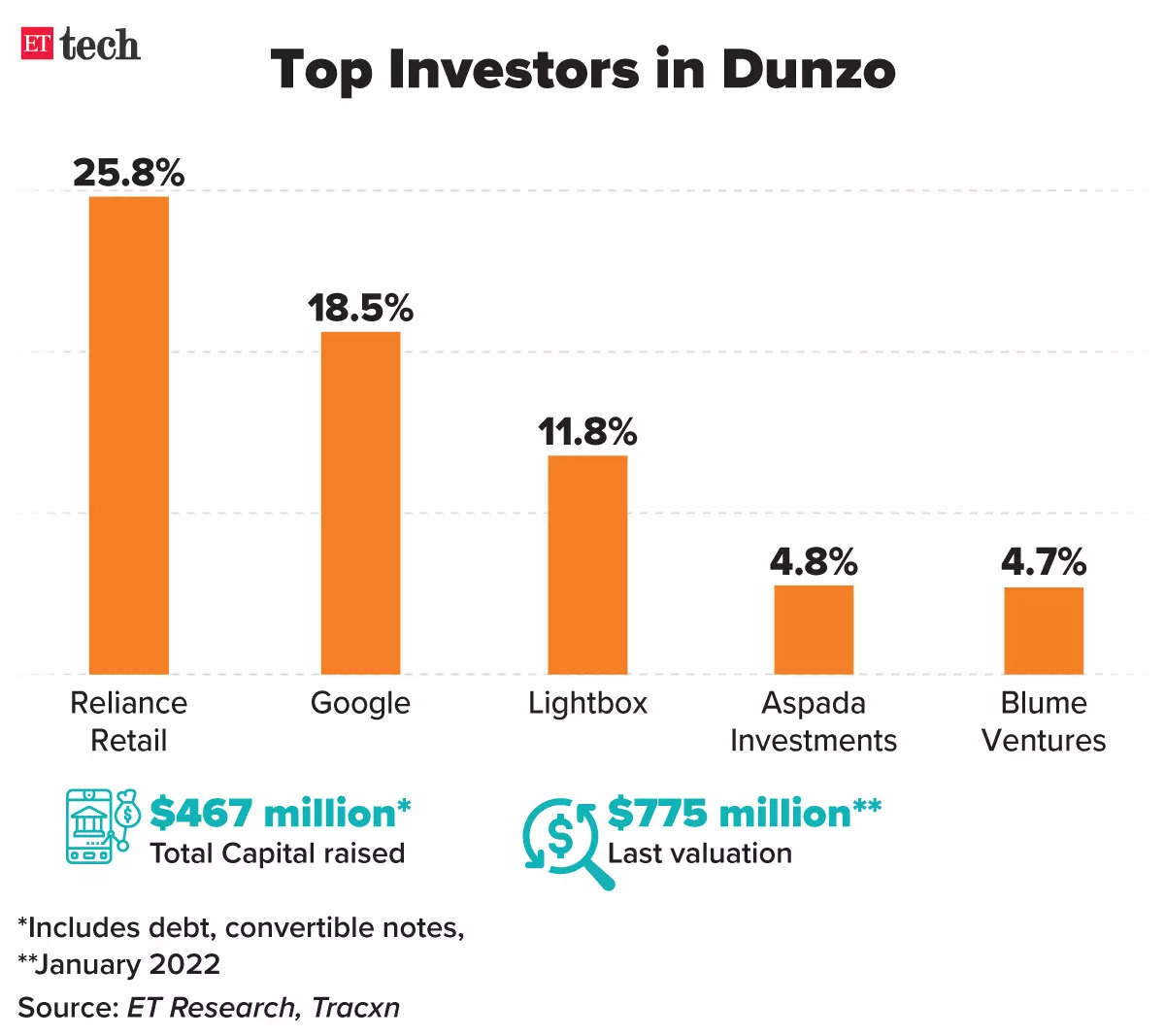
The longer the funding took, the more Dunzo’s plans changed. To slash its costs, the firm undertook its biggest round of job cuts in April. It thought that that would help it raise the required cash. It didn’t.
Dunzo only managed to secure $45 million from two of its largest investors and consistently worked towards reducing costs, as it was still short of its targeted $75 million by a good $30 million.
Clutching at straws, the company further delayed salaries and announced another 200-odd job cuts. Employees, who have been rattled for a while, were upset with how the leadership had communicated the news this week.
According to sources briefed on Dunzo’s numbers, there’s been an improvement in its unit economics, albeit at a much smaller scale. But despite all this, it’s not clear if Dunzo will deliver the goods again.
Dunzo’s unravelling
Quick commerce startup Dunzo announces more job cuts: Dunzo has informed its staff about fresh layoffs, which will impact around 150-200 employees, people aware of the matter said. This is the third round of layoffs at the Reliance Retail-backed firm, which is grappling with cash flow issues.
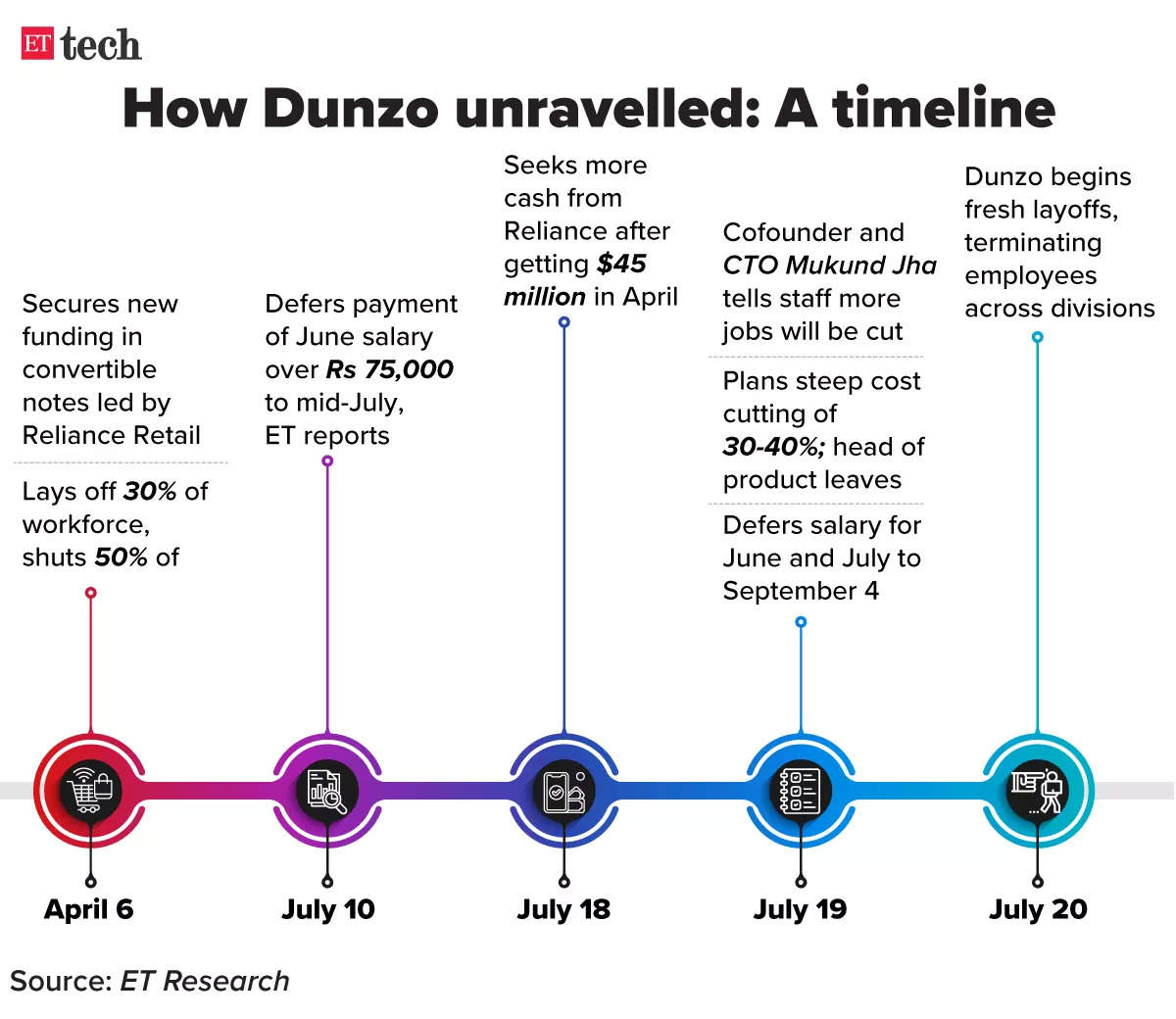
People aware of the latest round of job cuts said several employees have been told that their roles would be redundant as the company needs to save capital by reducing costs.
Dunzo seeks a lifeline; defers salaries to September: Dunzo has decided to reduce costs by 30-40% even as it further delays the payment of salaries.
While the cash-strapped company on July 19 informed employees about the delayed salaries, chief executive Kabeer Biswas was in Mumbai meeting existing investors to secure funds.
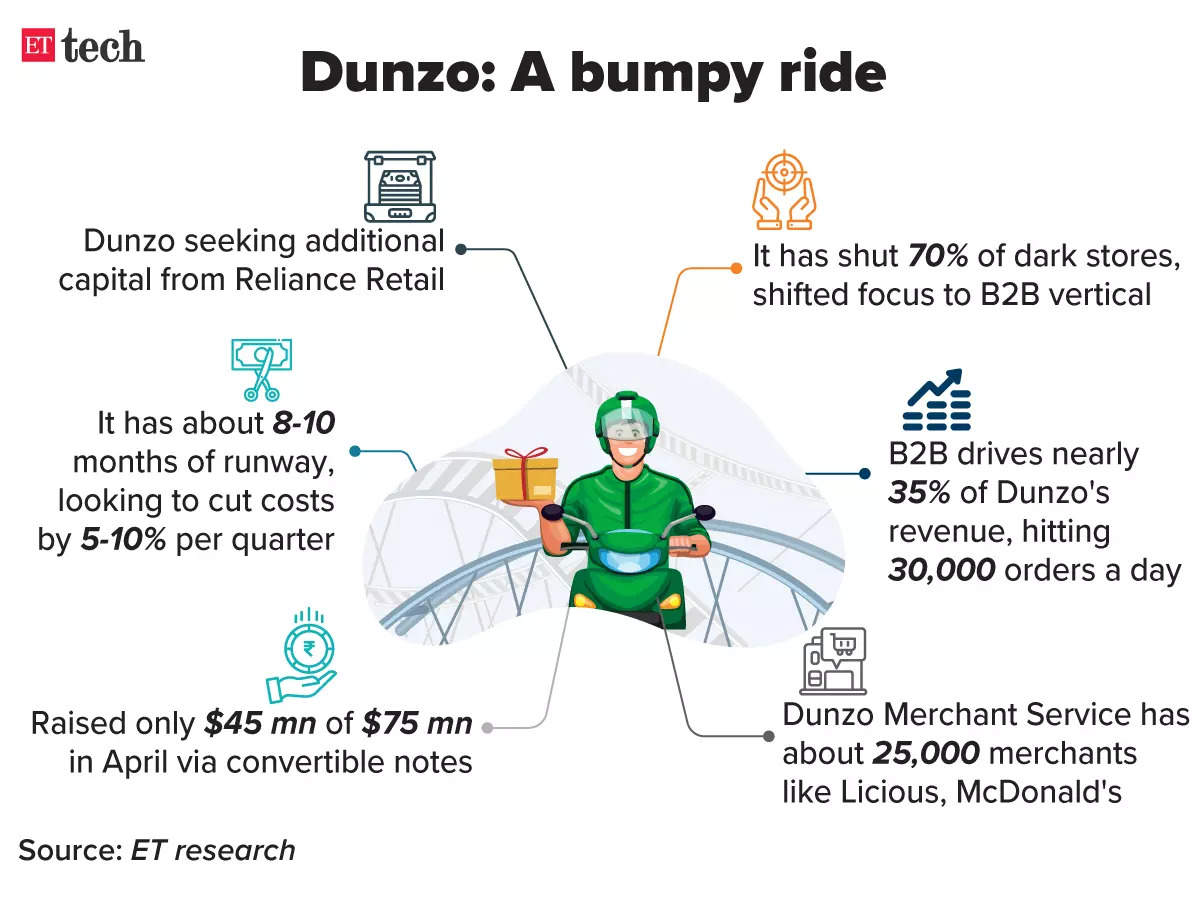
Dunzo eyes $20 million more from Reliance Retail: Dunzo is seeking at least $20 million (about Rs 165 crore) more from Reliance Retail, its largest shareholder after the company fell short of its target to raise $75 million by offering convertible notes, people aware of the discussions said.
E-gaming’s taxing times

Tiger Global, Peak XV, other egaming investors write to PM on 28% GST: A group of 30 Indian and foreign investors in online gaming companies have written to Prime Minister Narendra Modi voicing concern over the proposal to impose 28% goods and services tax (GST) on the full face value of online gaming transactions.
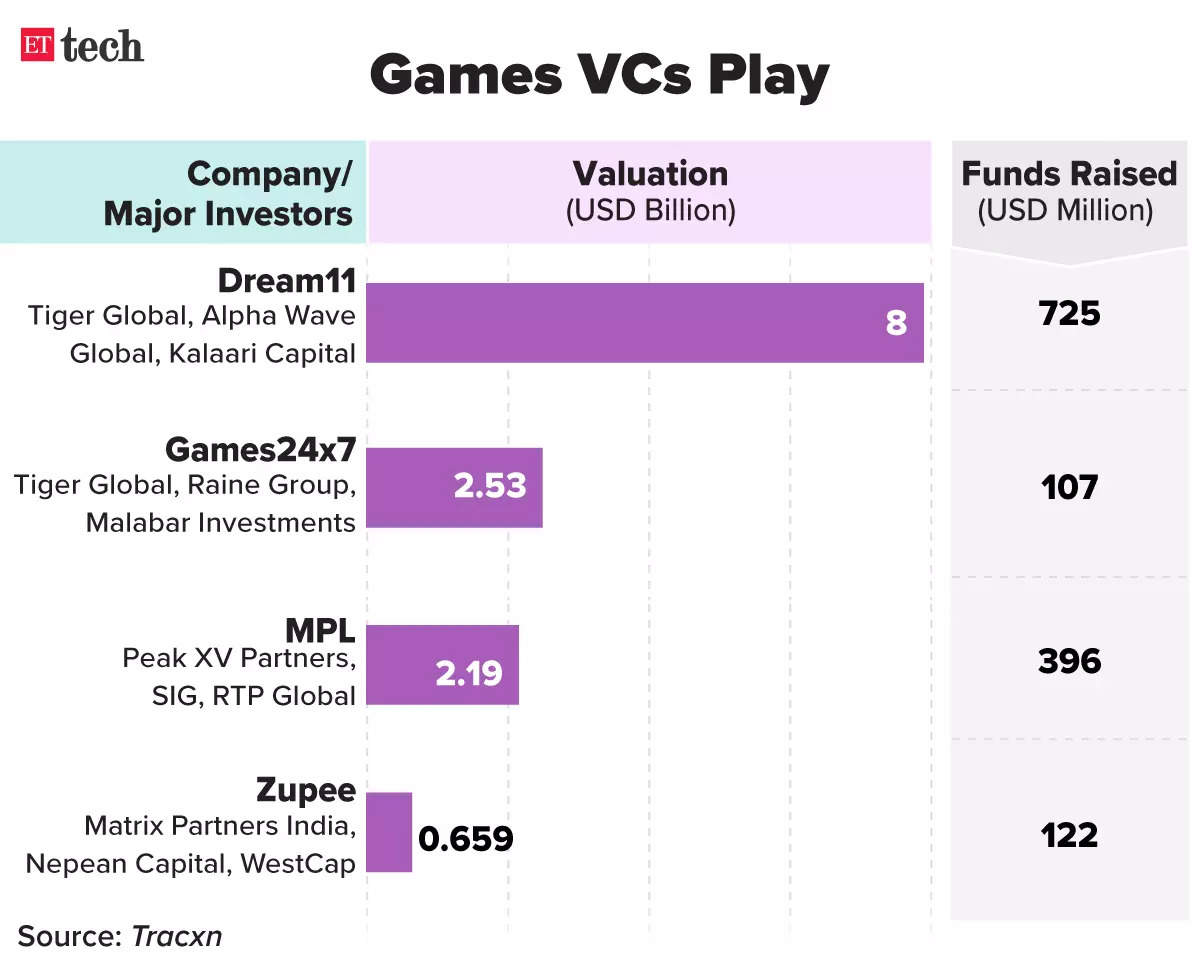
ETtech had exclusively reported on July 19 that large investors in the online gaming sector were planning to come together and write to the government protesting this move.
Also Read | Regulatory tech companies fear 25% knock-on hit from gaming GST
Online gaming firms await clarity on taxation of winnings: Online gaming companies are worried that a potential taxation of the winnings could be a death knell for the sector, and are awaiting a detailed notification from the law committee of the GST Council.
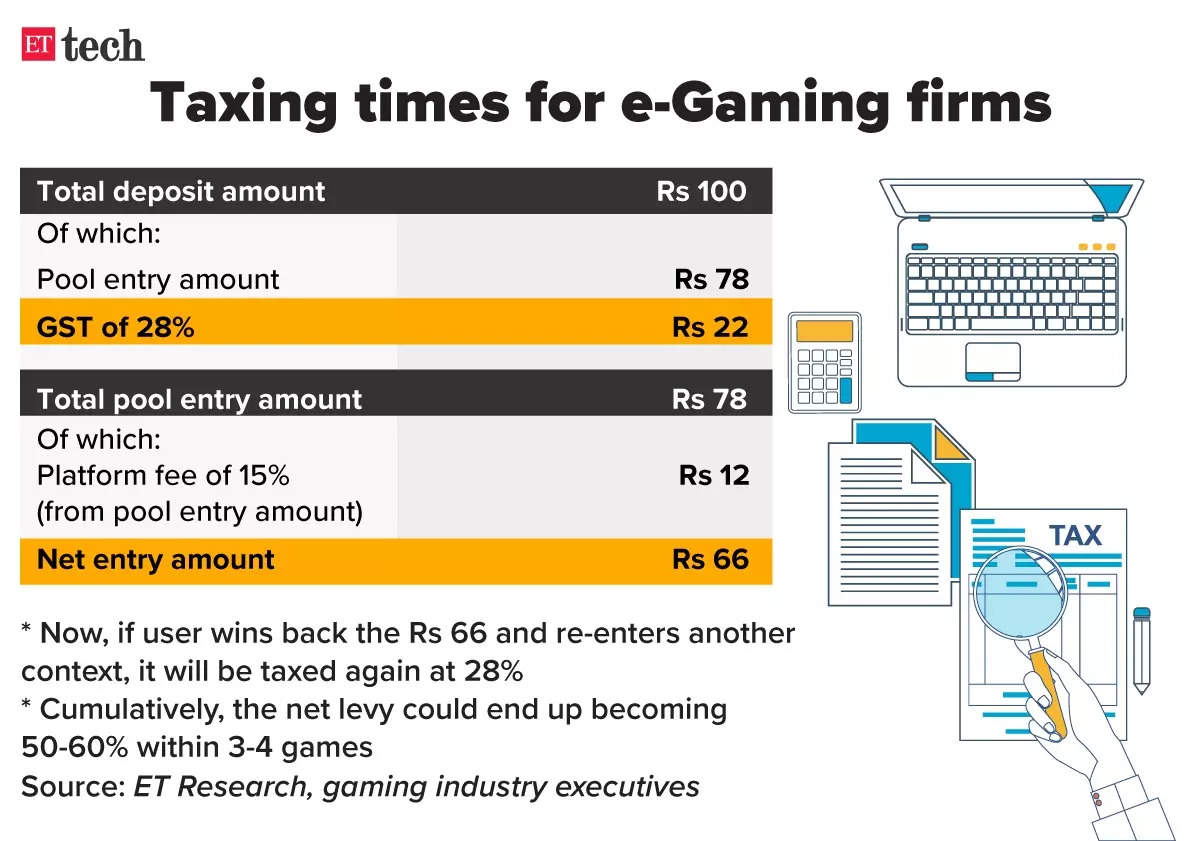
Fintech Corner

Jio Financial set to shake up lending: An anxious lot of digital lending startups and their investors are watching from the sidelines as Jio Financial Services gets demerged from Reliance Industries. Given the Reliance playbook, it is obvious that Jio Financial will try to take its services to the masses, and more.
Fintechs queue up for NBFC licences: Pune-based OneCard and Bengaluru’s WintWealth have applied for licences to operate as non-banking finance companies, people in the know said, joining fintech majors such as Cred, Groww and Jupiter that have recently bagged such licences.
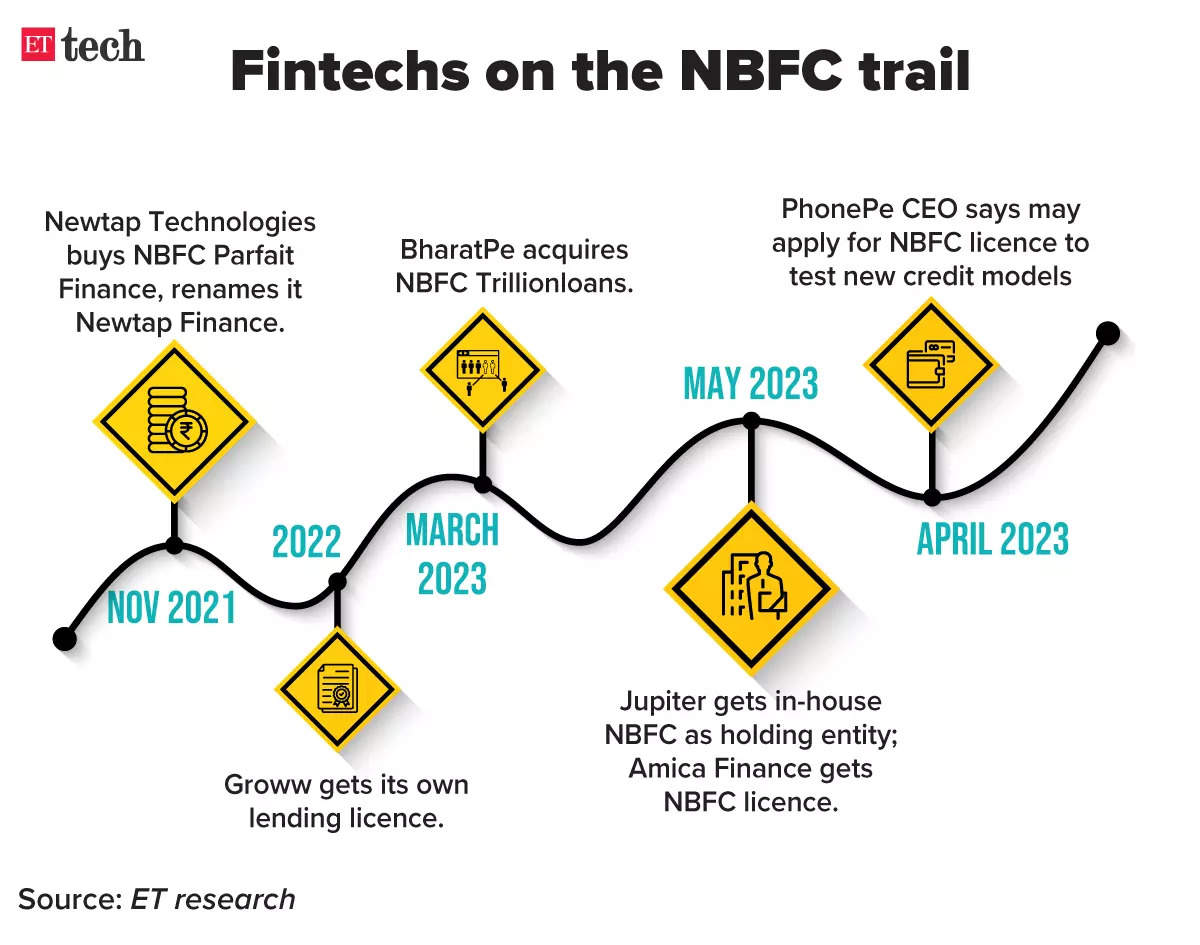
SoftBank sells another 2% in Paytm, holding slips below 10%: SoftBank has sold an additional 2% stake in One 97 Communications, the parent of Paytm, in a series of transactions, generating $180-200 million, sources said. This will bring the Japanese investment major’s stake in the payments company to below 10%.
IT Earnings
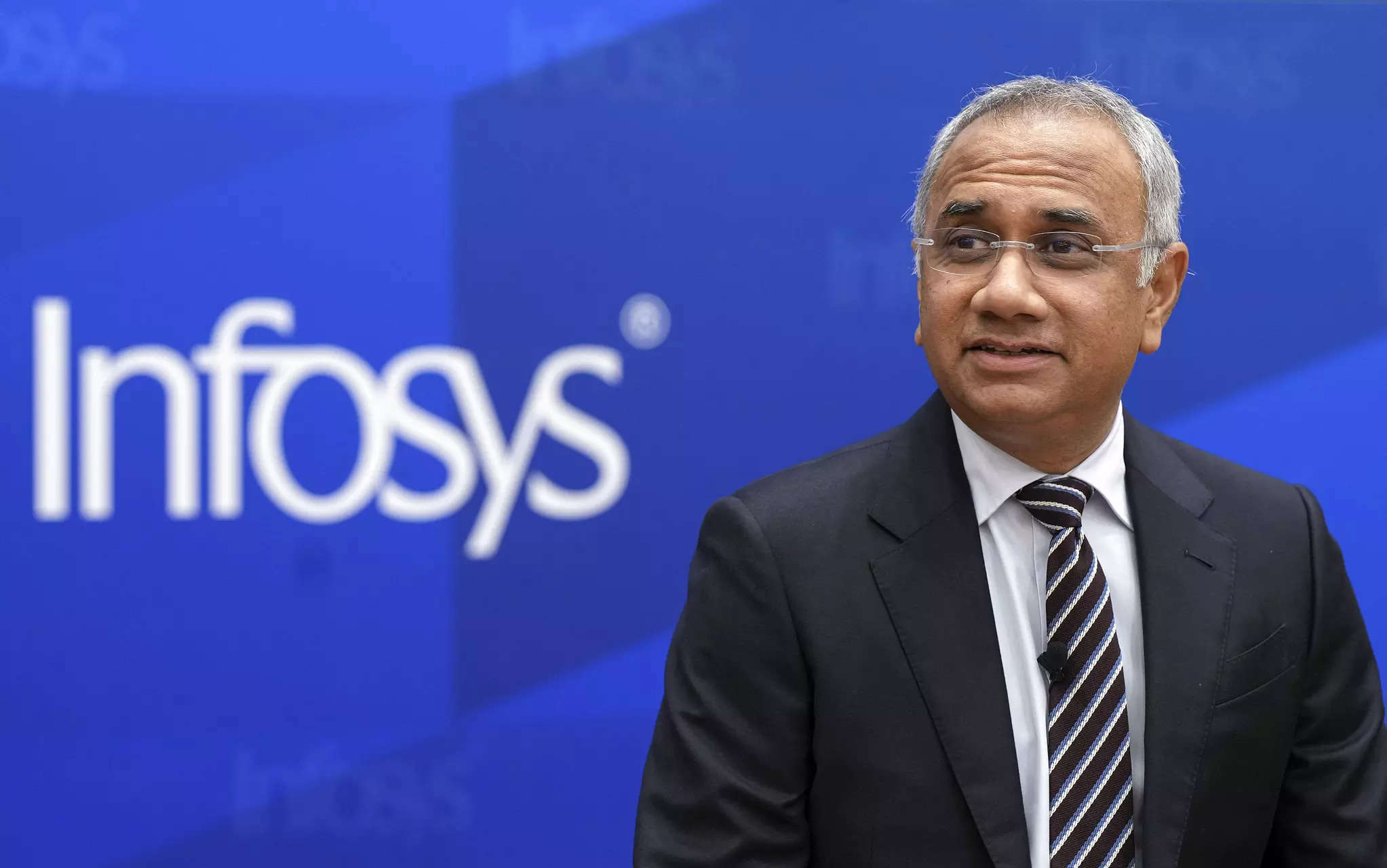
Infosys PAT rises 11% but misses estimates; sales outlook halved: Infosys posted a nearly 11% increase in its first-quarter net profit, but missed analyst estimates, and slashed its revenue growth outlook for the fiscal year. The company is blaming spending cuts and delays in decision-making by clients for the subdued outlook, especially in the key financial services domain.
LTIMindtree’s Q1 net profit up 4% to Rs 1,152 crore: LTIMindtree, which now features in the Nifty 50, missed forecasts to report a 4% June-quarter profit growth due to what the company called a “challenging macroeconomic environment”.
Delays in deal closures hurt LTIMindtree in the June quarter, but CEO Debashis Chatterjee told ETtech that stronger offshoring demand due to cost optimisation by clients helped expand operating margins of the newest member of the elite Nifty 50 club.
Wipro’s $1 bn AI play will be self-financed: CEO Thierry Delaporte | In an interview with ETtech, CEO Thierry Delaporte said that Wipro is betting big on artificial intelligence. “A billion Dollars will be invested over three years, to enhance our capabilities, solutions, platforms, assets and offerings around AI for our clients and for ourselves,”he said.
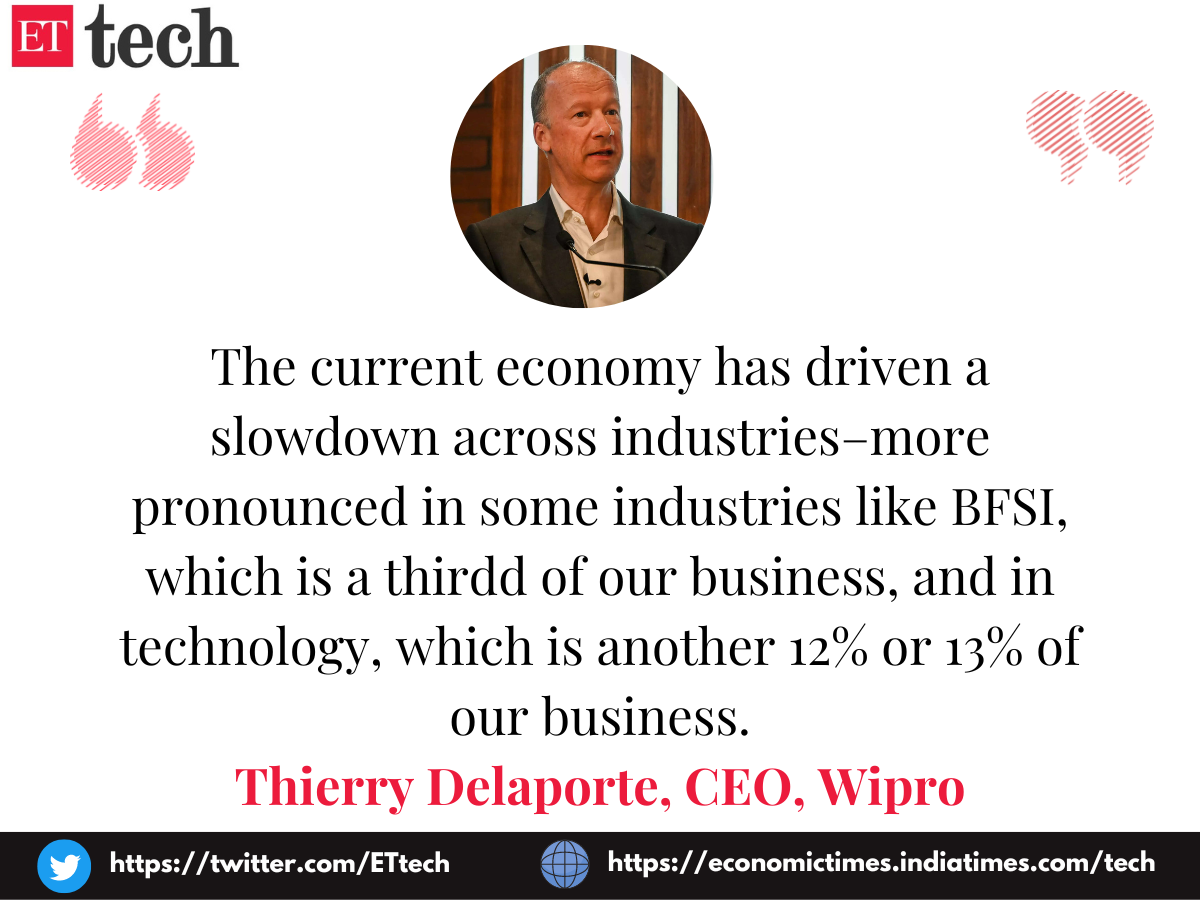
Wipro reported a fall in its net profit and revenue for the first quarter ended June amid weak performances by key verticals like financial services and communications.
Other Top Stories This Week

Stars line up for startups: Just when private equity and venture capital investments in Indian startups have dried up, a new set of investors are doubling down on emerging startups and direct-to-consumer (D2C) brands like never before —celebrities across Bollywood and sports.
Shark Tank India season 1 | Only 43% of the deals closed | Over a year after Shark Tank India season 1 aired on television, seven of the so-called sharks (investors) completed only 28 of the 65 soft commitments they had made to startups that participated in the show, according to an analysis by PrivateCircle Research.
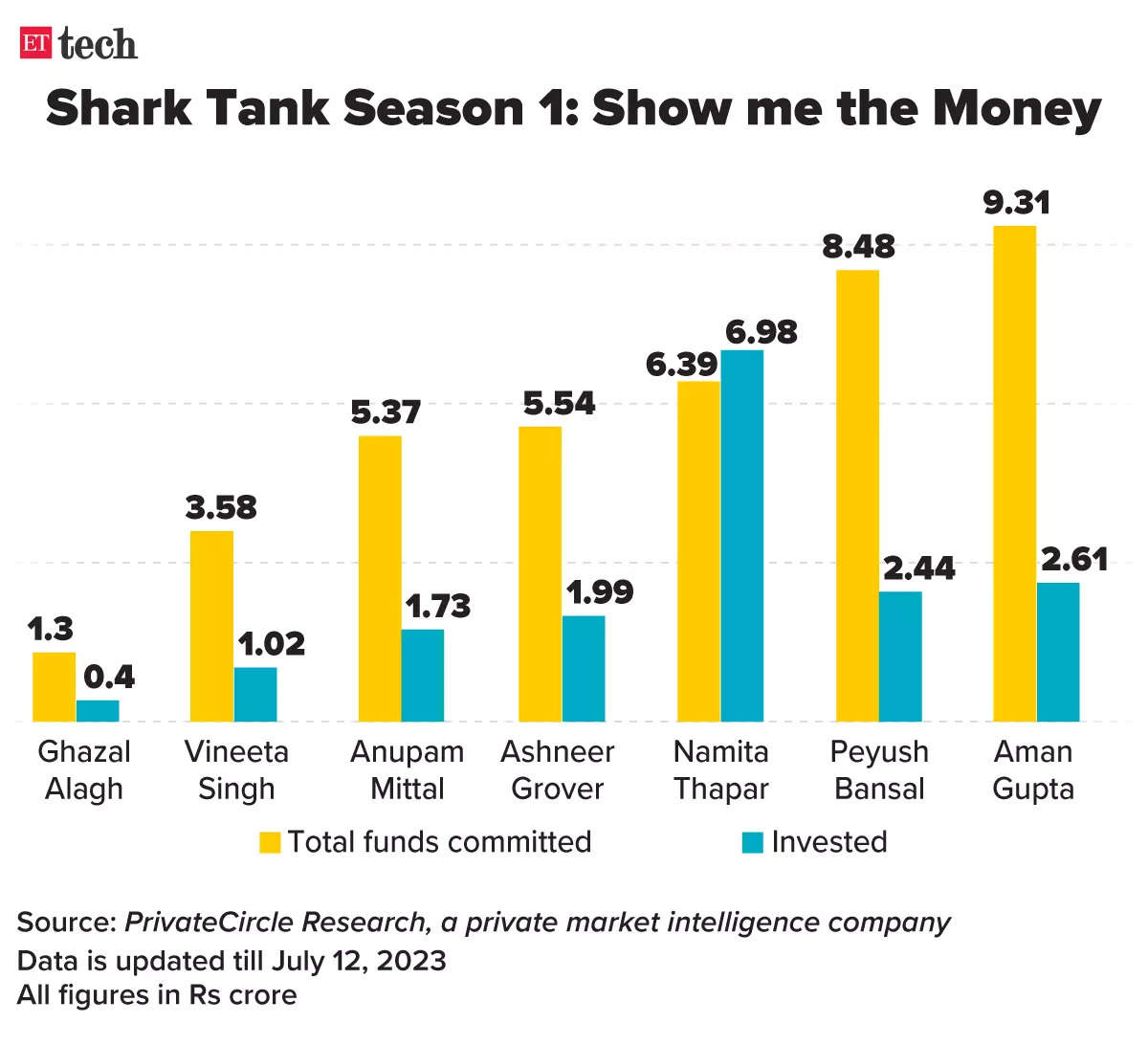
IT headcount shrinks sharpest in 3 years: Aggregate staffing at Tata Consultancy Services (TCS), Infosys, HCLTech, Wipro, LTIMindtree, and L&T Technology Services (LTTS) contracted by 18,000. This was worse than a negative 9,000 in the June quarter of 2021, which was during the pandemic, according to data compiled by Xpheno for the last three financial years.
HCL Group planning $300 million semicon foray: The Shiv Nadar-founded HCL Group, which began decades ago as a maker of computer hardware and peripherals before establishing its software credentials globally, plans an ambitious foray into India’s fast-evolving semiconductor ecosystem.
Cybersecurity bill to define contours of online safety, security: The centre is working on the contours of a cyber-security bill that may define various aspects of online safety and set down objective parameters and rules spelling out what constitutes cyber fraud.
OTT apps join the fight against Google’s billing policy: The Indian Digital Media Industry Foundation (IDMIF), an industry body representing some of the major streaming players in India, moved the Competition Commission of India (CCI) against Google’s app store billing policy, people aware of the development told ET.
ETtech Deals Digest
AI software firm o9 Solutions pushes up overall funding in Indian startups this week:
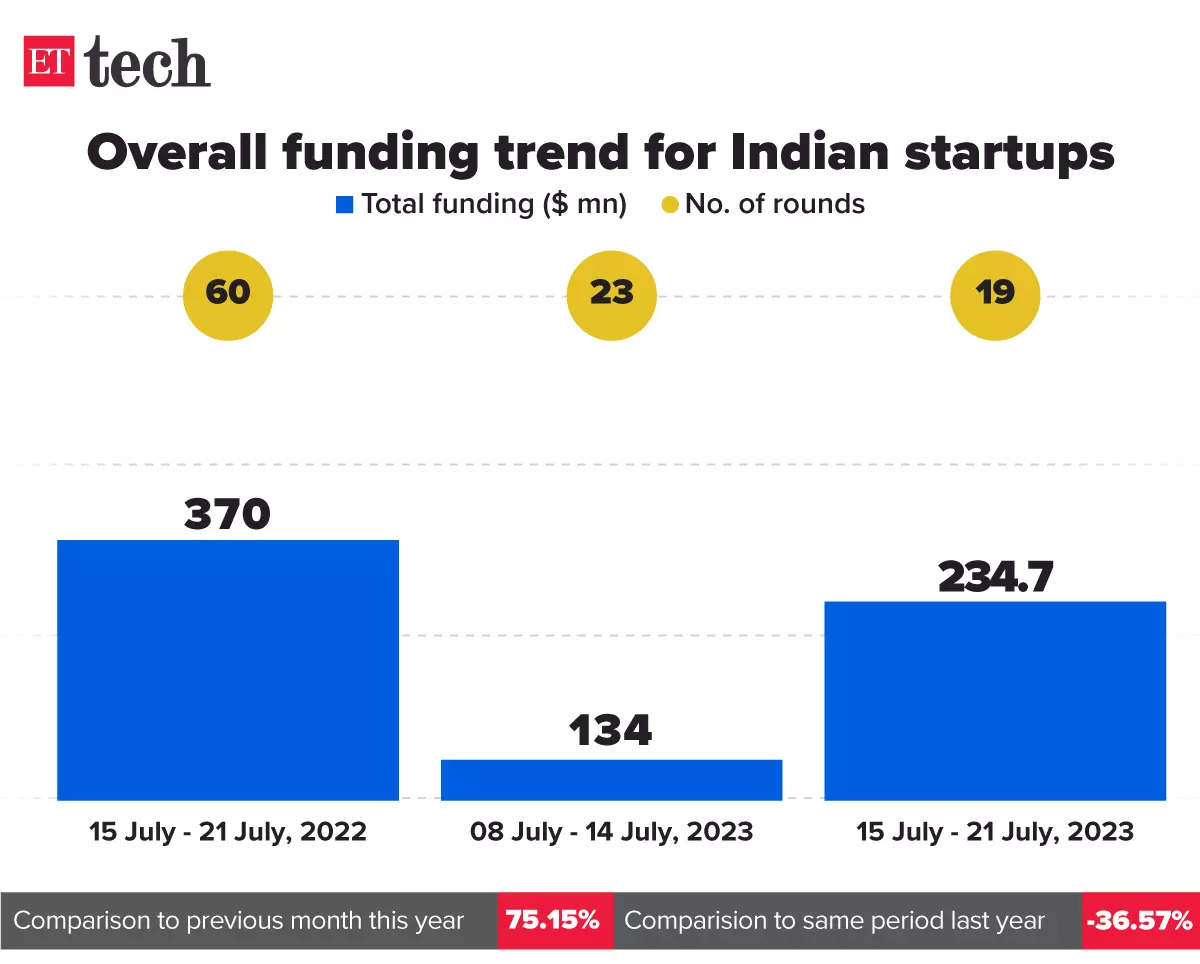
Late-stage startups comprised the bulk of the funding during the week, raising a total of $193.1 million, while early-stage startups raised $20.9 million, and seed stage firms received $20.7 million.
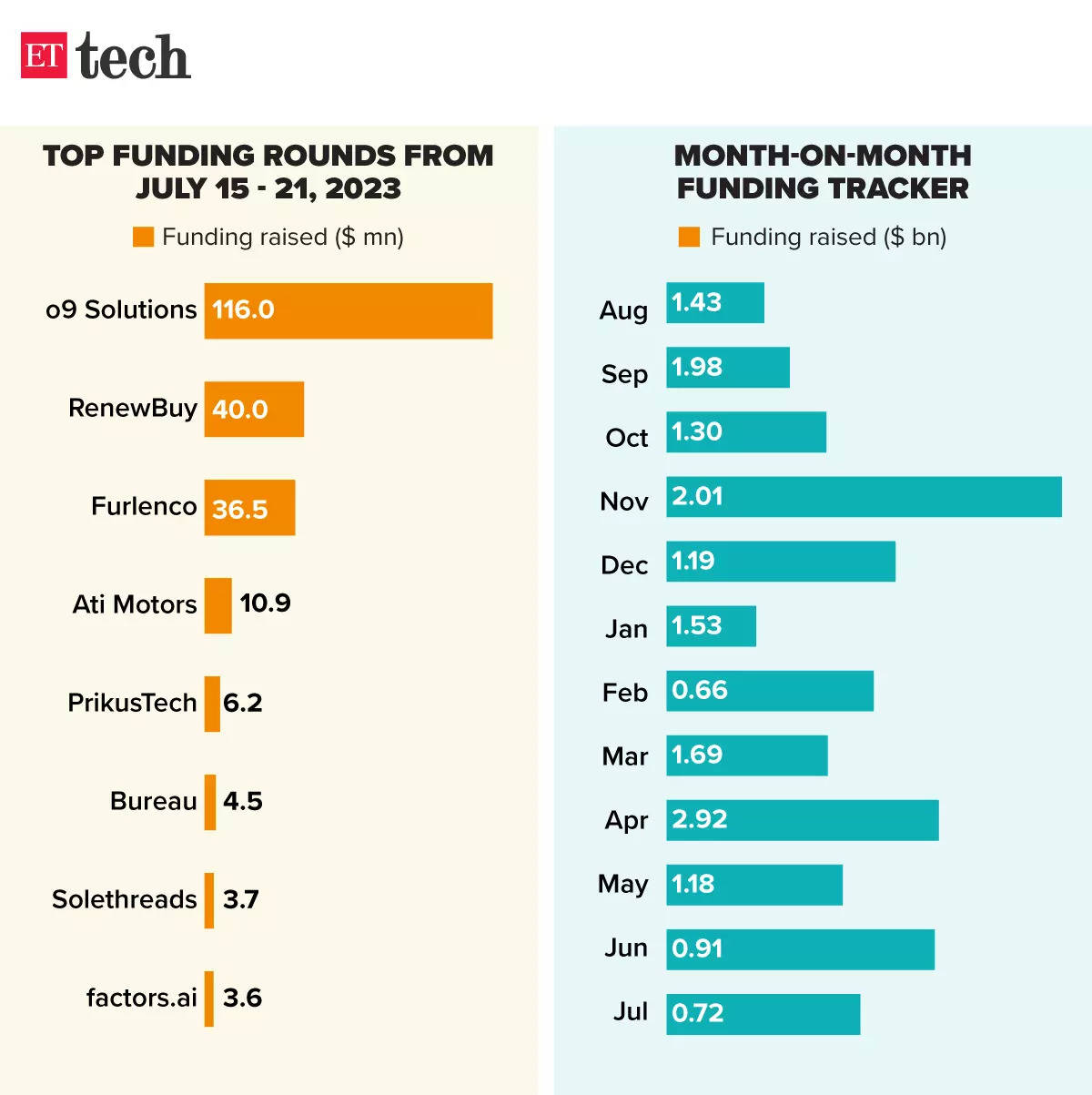
The total fundraise of $234.7 million across 19 deals marked a decline of about 37% compared to the same period last year, when startups raised $370 million across 60 rounds.
For all the latest Technology News Click Here
For the latest news and updates, follow us on Google News.

